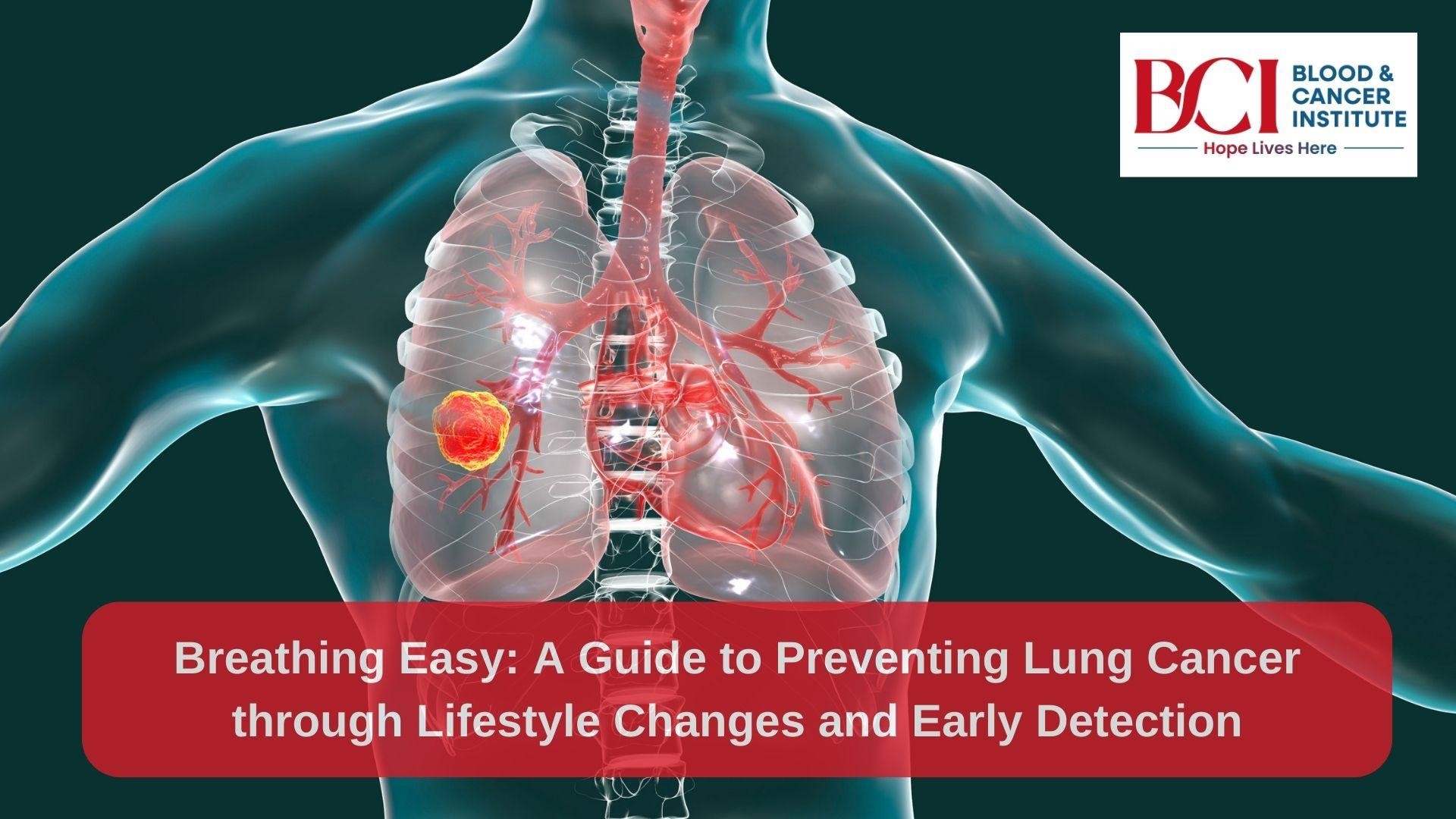
- By : [email protected]
- Blog
- Comments: 0
Breathing Easy: A Guide to Preventing Lung Cancer through Lifestyle Changes and Early Detection
In the grand tapestry of human health, few challenges loom as large as lung cancer. As one of the leading causes of cancer-related deaths worldwide, lung cancer demands our attention and a proactive approach. In this blog by our Lung cancer specialist in Surat at BCI- Blood & Cancer Institute, we will look at the impact of lifestyle changes and early detection strategies in preventing lung cancer, offering a breath of hope to those seeking to safeguard their respiratory well-being.
Section 1: Understanding the Enemy
Before delving into prevention, it’s crucial to understand the nature of the adversary. Lung cancer often develops silently, with symptoms surfacing in later stages when treatment options may be limited. Most cases of lung cancer are linked to cigarette smoking, but non-smokers can also be at risk due to factors such as secondhand smoke, environmental pollutants, and genetic predisposition.
Section 2: Lifestyle Changes for Lung Health
According to our cancer specialists in Surat at BCI- Blood & Cancer Institute, prevention of this life-threatening disease necessitates some lifestyle changes like:
a. Quit Smoking: The Ultimate Game-Changer
The single most impactful lifestyle change for preventing lung cancer is quitting smoking. Cigarette smoke contains a myriad of carcinogens that can damage lung cells and lead to the development of cancer. The sooner one quits, the greater the reduction in risk. Numerous resources, from support groups to smoking cessation aids, are available to help individuals kick the habit and embark on a healthier path.
b. Embrace Physical Activity: A Breath of Fresh Air
Regular physical activity not only enhances overall well-being but also plays a crucial role in lung health. Exercise improves lung capacity and circulation, promoting efficient oxygen exchange. Our lung cancer specialists in Surat recommend incorporating activities like brisk walking, jogging, or cycling into your routine. These activities can significantly contribute to the prevention of lung cancer and bolster your body’s natural defenses.
c. Eat a Lung-Friendly Diet: Fuel for Health
Nutrition is a powerful tool in preventing lung cancer. Include a variety of fruits, vegetables, and whole grains in your diet, as they are rich in antioxidants and essential nutrients. Foods like broccoli, kale, and berries have been linked to lower cancer risk. Additionally, omega-3 fatty acids found in fish may offer protective benefits for lung health.
d. Limit Exposure to Environmental Toxins: Clearing the Air
Reducing exposure to environmental pollutants is another key aspect of lung cancer prevention. Be mindful of air quality, especially in urban areas, and take steps to minimize exposure to harmful substances like asbestos and radon. Proper ventilation in living and working spaces is crucial for maintaining clean air and reducing the risk of lung cancer.
Section 3: Early Detection Strategies
Like every other disease, early detection sets the tone for effective lung cancer treatment in Surat. Some early detection strategies include:
a. Regular Health Check-ups: The Proactive Approach
Regular health check-ups are a cornerstone of early detection. Routine screenings, such as chest X-rays and CT scans, can help identify abnormalities in the lungs before symptoms manifest. For those with a history of smoking or other risk factors, these screenings can be particularly beneficial in catching potential issues at an early, more treatable stage.
b. Know the Signs: Listening to Your Body
While early-stage lung cancer may not always exhibit noticeable symptoms, being aware of potential warning signs is essential. Persistent coughing, shortness of breath, chest pain, unexplained weight loss, and recurrent respiratory infections can all be indicators of a problem. Recognizing these signs and promptly seeking medical attention can lead to earlier diagnosis and improved outcomes.
c. Genetic Testing
For individuals with a family history of lung cancer or other risk factors, genetic testing can provide valuable insights. Identifying genetic mutations associated with an increased risk of lung cancer allows for personalized screening plans and targeted preventive measures. Consult with our healthcare professional at BCI- Blood and Cancer Institute, considered as one of the best cancer hospitals in Surat, to determine if genetic testing is appropriate for your situation.
Section 4: The Power of Advocacy and Awareness
Our cancer specialists from BCI, share the power of advocacy and awareness by:
a. Educating and Advocating
Advocacy and awareness are vital components of the broader effort to prevent lung cancer. By educating communities about the risks associated with smoking, the importance of clean air, and the value of early detection, we can collectively work towards reducing the incidence of lung cancer. Support initiatives that promote smoking cessation programs, advocate for clean air policies, and raise awareness about the disease.
b. Destigmatize Lung Cancer
Lung cancer carries a stigma often associated with smoking. Destigmatizing the disease is crucial for fostering empathy, understanding, and support for individuals facing a lung cancer diagnosis. By promoting open conversations, we can encourage regular health check-ups, dispel myths, and create an environment where those at risk feel empowered to take proactive measures for their lung health.
Conclusion
Preventing lung cancer requires a combination of lifestyle changes, early detection strategies, and a collective commitment to advocacy and awareness. Whether you’re a current or former smoker, or even a non-smoker, taking proactive steps to protect your lung health can significantly reduce the risk of developing this life-threatening disease. By embracing a lung-friendly lifestyle, staying vigilant about potential symptoms, and actively participating in advocacy efforts, we can collectively work towards a future where lung cancer is a preventable and manageable health challenge. Breath by breath, step by step, let’s build a world with the best lung cancer specialists in Surat available at BCI- Blood and Cancer Institute, where breathing easy is a shared reality for all.
